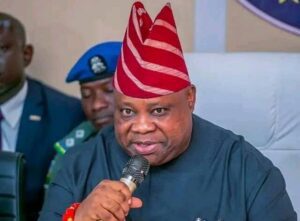
UBA MD, Access Bank MD others bag CIBN honorary fellowship
At a grandeur event held in Victoria Island Lagos on Saturday, the CIBN awarded 20 Honorary fellowships, 154 elected fellows and 275 Honorary senior members.The Institute also conferred a posthumous award on the late Professor Sunday Oladeji who served meritoriously as an Examiner of the Institute for thirty-three (33) uninterrupted years. Professor Sunday passed on to glory on June 12, 2023, shortly after he was recommended by the Board of Fellows and Practice License for the conferment of the award.
The President and Chairman-in-council of the CIBN, Mr Ken Opara felicitated with the recipients of the various awards.
He prayed that they continue to excel in their various fields of endeavour and continue to fly the flag of The Chartered Institute of Bankers of Nigeria higher in their sphere of influence.
Opara also noted that in a rapidly changing world, the success of nations was often determined by their ability to harness their inherent strengths and overcome their challenges.
According to him, Nigeria, with its abundant human and natural resources, possesses incredible economic potential.
The CIBN president noted that inequality, in terms of income and opportunities, had remained high and had adversely affected poverty reduction.
“Lack of job opportunities is at the core of high poverty levels, regional inequality, and social and political unrest.
“High inflation has also taken a toll on household’s welfare, pushing more people into poverty.
“Given these numerous challenges, it is abundantly clear that our journey toward harnessing Nigeria’s economic potential for growth and development is marked by both promise and complexity.
“Addressing these challenges requires visionary leadership and collaborative efforts to transform adversity into opportunity.
“The path ahead demands resilience, creativity, and a commitment to shaping a brighter future for our country.
“Hence, it is incumbent upon us, as banking professionals and leaders, to chart a course that leverages the vast potential inherent in our nation’s economy.
“We must explore innovative strategies and approaches that will drive sustainable growth, foster development, and ultimately uplift the lives of all Nigerians,’’ Opara said.
He, however, said unlocking these potential required strategic imperatives that would go beyond mere recognition but deliberate action and innovative thinking.
He said, “According to data released by the World Bank, Nigeria remains Africa’s largest economy with $477.4 billion in Gross Domestic Product.
“While Nigeria has made some progress in socio-economic terms in recent years, its human capital development ranked only 150 out of 157 countries in the World Bank’s 2020 Human Capital Index.
“The country continues to face massive development challenges, including the need to reduce its dependence on oil for exports and revenues, diversify its foreign exchange sources, close the infrastructure gap, build strong and effective institutions, address governance issues, and strengthen public financial management systems.”
Prof. Joseph Nnanna, the Chief Economist, Development Bank of Nigeria Plc, while speaking on the theme, said the multidimensional concept of growth and development encompasses far more than mere economic indicators.
“Nigeria’s overreliance on oil export has rendered its growth trajectory susceptible to endogenous and exogenous shocks in global oil prices, leading to economic instability.
“However, amidst these challenges lies a path forward, through strategic imperatives that can unlock Nigeria’s vast economic potential.
“Economic diversification emerges as a crucial avenue, leveraging the untapped potential of non-oil sectors to promote inclusive sustainable growth.
“Also, human capital development takes centre stage, acknowledging that education and health are at the core of economic growth.
“Lastly, infrastructure development stands as another cornerstone, underscoring the importance of building a modern and efficient infrastructure network,” Nnanna said.
These strategic imperatives, he said, were not standalone solutions and would need to be complemented with addressing policy implementation, resource allocation, corruption, and leadership.
“In doing so, Nigeria can move beyond the constraints of its past, harness the strength of its resources, and emerge as a beacon of inclusive growth and development on the African continent,” he stressed.



